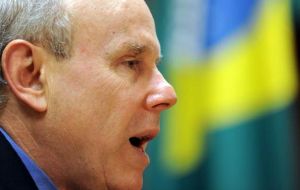MercoPress. South Atlantic News Agency
Mantega proposes “diluted” inflation index with no fuel or food items included
 The confirmed minister promises a mother of all battles against high interest rates
The confirmed minister promises a mother of all battles against high interest rates Brazil Finance minister Guido Mantega is proposing a “dehydrated” inflation index with the purpose of reducing interest rates faster under the incoming administration of president-elect Dilma Rousseff, reports the influential O Estado de Sao Paulo.
Currently the Brazilian central bank already partially applies the initiative excluding from the consumer prices index some food and energy items. But Mantega wants to go further and create a new CPI with such items purged from the index.
This new kind of “accountancy” (following on the US Federal Reserve) for inflation, which will also be applied by the incoming administration for government accounts is justified by Mantega “because Brazil has become accustomed to look at full inflation indices”.
The proposed new index would lead to a discussion on monetary policy inflation-targeting, which in Brazil has been established at 4.5% for 2011 and 2012. The current inflation index known as IPCA for the last twelve months stands at 5.2%, and according to a first line private bank, purging food and energy, would have dropped to 4.16%.
Next June the incoming administration will have to decide on the inflation target for 2013 and confirm the 4.5% for 2012.
If the new government finally adopts the idea of a new inflation index, this could mean less influence in containing the phenomenon through the interest rate policy points out O Estado de Sao Paulo.
Sources close to Mantega have said that based on this the Central Bank would not be forced to react immediately to “momentary and transitory” movements triggered many times because of climate conditions or external shocks. However a negative point is that the new approach will make it difficult to identify structural changes in the food and fuel prices system.
Mantega as Finance minister with President Lula da Silva has always been critical of the Central bank’s rapid reaction to inflation signals, which in many cases had nothing to do with the overall performance of the economy’s demand. There’s a quote from the minister in April 2008 that remains historical: the cause for high inflation has been “the “feijaozinho” (surging price of black beans) that are consumed by all Brazilians”.
However confirmed in his post, Mantega now wants to move the focus from the Central Bank’ full index to the “purged” index. The Brazilian central bank has argued that the full index is much easier for the people to understand how the system works. But independently of this the Monetary Council of the bank, Copom, which decides on interest rates, works with at least three different indices and not only with the official IPCA.
In an interview with GloboNews Mantega said that the Brazilian economy needs adjustments so the new government can lower the inflation target. He admitted nevertheless that a lower target could also mean under certain circumstances higher interest rates and less growth. But he also pointed out that significant sectors of the Brazilian economy remain indexed, which hampers decision on inflation. Mantega specifically mentioned the indexed prices of government managed public utilities (electricity, rents) but this problem “could be solved by diluting those and other items” and appealing to improved indices.
With only a few days left for the Central bank Copom’s meeting, Mantega said he would accept a bank’s decision to increase rates but also cautioned that it would only happen “if it were necessary”.
“We know that raising the interest rate has a cost for the country and for the government that must pay more for bonds and other debt papers”, underlined the minister.
Finally in what was seen as a subtle criticism of the central bank’s current president Henrique Meirelles, Mantega praised the nomination of Alexandre Tombini to succeed him as head of monetary policy arguing the nominee has an advantage since he’s a career official from the bank and therefore is more receptive to adopting measures that could go against the interests of the financial market.
“I believe Tombini is an excellent professional and choice. He’s a career official from the central bank, he does not come from the financial sector, and therefore will not be hesitant on adopting measures that could harm or hinder the financial sector”.
Meirelles is not only a renowned economist but also comes form the financial sector where he ended a most successful career as CEO of BankBoston Brazil.




Top Comments
Disclaimer & comment rulesCommenting for this story is now closed.
If you have a Facebook account, become a fan and comment on our Facebook Page!